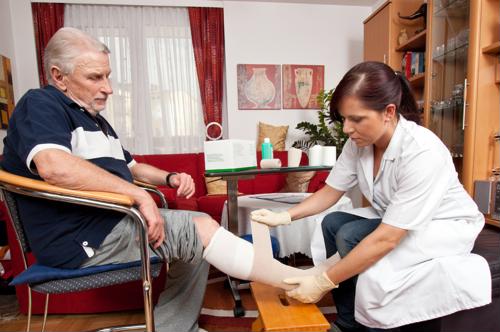
Have you noticed your senior loved one has developed more bruises than usual lately? Seeing more black and blue as we age isn’t uncommon. Bruises, otherwise known as contusions, occur when small blood vessels, called capillaries, near the skin’s surface break. The blood leaks out of the vessels, creating that familiar black-and-blue mark of a bruise. Then, the body reabsorbs the blood, clearing the bruise away.
Find Senior Living Near Me
Capillaries become ruptured from the impact of some blow or injury to the body. These injuries can range from falling to bumping into an object to even a doctor’s visit involving IV procedures. Seniors are not only highly likely to sustain injuries that lead to bruising, but their skin also bruises more easily than that of younger adults. According to the Mayo Clinic, our skin becomes thinner and weaker as we age, and we often lose that fatty layer that protects our capillaries. Because seniors no longer have that cushion of defense, even a slight impact can lead to a bruise. Learn what may cause bruises for seniors and how you can help your loved ones:
Do medications contribute to bruising?
Certain medications that reduce your risk for blood clots may contribute to easier bruising. For example, common over-the-counter medications such as ibuprofen and aspirin may cause easier bruising because they thin the blood. The thinner blood takes longer to absorb back into the body, so bruises can appear larger and remain for longer periods of time if your senior loved one is taking these medications.
 Ask your senior loved one what medications he or she is taking.
Ask your senior loved one what medications he or she is taking.Why does my senior parent have so many bruises?
Aside from thinning skin, seniors may be more prone to falls due to decreased ability to balance. According to a study in the Journal of Clinical Epidemiology, 1 in 3 adults over the age of 65 will experience a fall each year. Unfortunately, fewer than half will report the fall to their assisted living healthcare providers, and they may leave you out of the loop, too, according to a study published in the American Journal of Preventative Medicine.
If you notice bruises on your senior parent, ask him or her how they occurred. If your loved one can’t offer an explanation, it may be from a fall. However, since seniors bruise so easily, they really may not know how it happened. Either way, ensure your parent has the necessary stability tools like a cane or walker. Additionally, you can reduce the chances of tripping by keeping walkways clear and ensuring rugs lie flat on the ground.
Is there a more serious problem?
While bruising itself will go away in two to three weeks, an underlying cause could pose a more serious threat. According to Healthgrades, easy and frequent bruising may be caused by autoimmune disorders, vitamin deficiencies, blood clotting disorders, leukemia, and other cancers. If you’re concerned about the bruises on your senior loved one or he or she is exhibiting other signs of these health issues, speak with his or her healthcare provider.
“At-home remedies can alleviate the pain and swelling.”
What can I do to help?
For more serious health conditions, it’s important that you encourage your senior loved one to speak to his or her doctor. However, for a standard bruise, you can use several at-home remedies to alleviate the pain and swelling.
According to AgingCare.com, caregivers can apply a cold compress to the bruise. Holding an ice pack there will reduce the blood flow to the area, decreasing the inflammation and taking down the swelling. You may want to wrap a thin towel around the ice pack so it’s not so cold on your loved one’s skin. If the bruise is on the ankle or leg, try to keep the limb elevated. Also, if you notice bruises, let the staff at your loved one’s assisted living community know so they can take over icing responsibilities when you’re not there.
Use these tips to keep your senior loved ones comfortable. Bruising can be painful, so make sure you reduce their risk for it and provide care as soon as possible.




